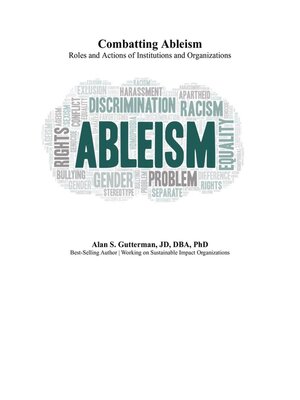
Sign up to save your library
With an OverDrive account, you can save your favorite libraries for at-a-glance information about availability. Find out more about OverDrive accounts.
Find this title in Libby, the library reading app by OverDrive.



Search for a digital library with this title
Title found at these libraries:
| Library Name | Distance |
|---|---|
| Loading... |
Ableism—the systemic devaluation and exclusion of people with disabilities—remains a persistent barrier to full social, economic, and political inclusion. People with disabilities face barriers not because of inherent limitations, but because of the environment and systems around them. Combatting ageism and ableism requires more than just policy pronouncements or isolated programs. It demands a comprehensive, multi-sector approach that transforms communities, services and institutions in order to improve the lives of people with disabilities and their caregivers. Challenging ableism means rethinking how organizations in every sector—government, business, education, civil society and healthcare providers—define inclusion, design programs, allocate resources and measure success.
At its core, a multi-sector approach recognizes that the challenges faced by people with disabilities are not isolated to a single domain. These challenges span across health and long-term care, housing, transportation, employment, education, civic participation and access to justice. Effective responses must therefore be integrated and inclusive, driven by collaboration among a broad coalition of stakeholders including governmental actors at all levels (i.e., federal, state and local), community-based organizations, businesses, academic institutions, healthcare providers, philanthropic institutions and the individuals most affected: people with disabilities and their caregivers.
This book offers a practical, cross-sector framework for change and describes the actions that actors operating in sectors that cross all of the day-to-day challenges for people with disabilities can take to combat ableism. It highlights the importance of inclusive leadership, community engagement and policy reform, and considers the broader cultural and structural conditions that sustain exclusion. Grounded in real-world examples and supported by research, this book is for practitioners, policymakers, advocates and anyone working to make their organization or community more inclusive. It shows that addressing ableism is not just a matter of compliance or accommodation—it is essential to building systems that respect the dignity, rights, and contributions of all people.







